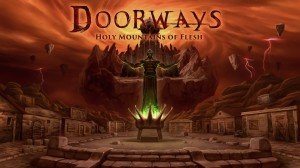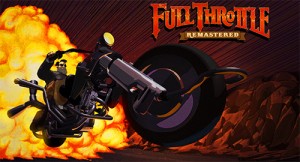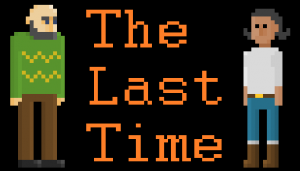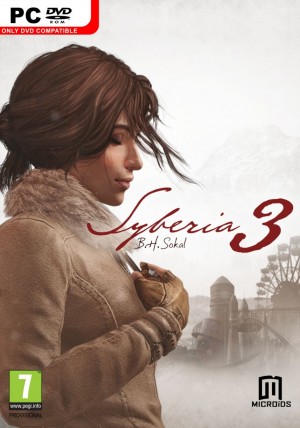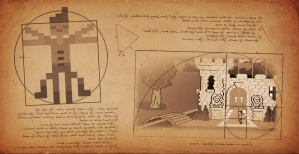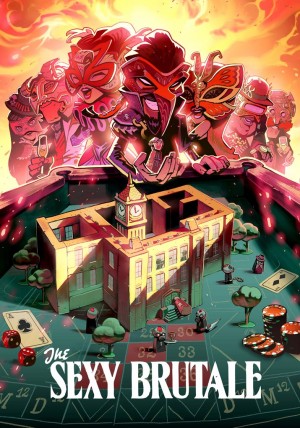Adventures in Germany and Beyond round table (Part 2) interview - page 3
If you happened to miss the first half of my extensive conversation with Jan “Poki” Müller-Michaelis, Jan Theysen and Jan Klose, you'll want to catch up and come back. If you're all up to date and raring for more, then read on as the Creative Directors of Daedalic, KING Art and Deck13 continue talking about the past, present, and possible future state of the genre both in our own country and around the world.
Ingmar Böke: During the second half of the 2000s, German publishers like dtp and Crimson Cow started signing genre veterans like Jane Jensen, Hal Barwood, Noah Falstein, Bill Tiller and others. Did this business model have an effect from your point of view?
Jan Klose: Yeah, a negative one, I’d say! (laughs) A lot of money was burned during those days.
Poki: I think the problem was that most of these games were heavily publisher-controlled.
 |
Deck13's Jan Klose |
Jan Klose: That’s one aspect; the other aspect is that you might have a genre veteran on board who calculated the way he used to, and then he said: “I need millions, I need another six months, I’ll re-write the script, I’m not satisfied with these people.” Perhaps that’s what he was used to, but this wasn’t a good match with smaller budgets, and not perfectly equipped for publishers when it came to their capacities, flexibility and the producers that supervised these projects. I think some of them just argued – I believe some ended up in court, several games had a huge delay and some of these people just ended up saying: “Screw this! I’m getting out of here!” Then they were gone, and these games had to be completed somehow. That was a pity because not a lot of good games came about at the time. But guys, please correct me if I’m wrong. Perhaps some of these games ended up being terrific. Let me know what comes to mind!
Poki: Well, no. For example, Bill Tiller is not a writer, he’s a visual artist, and games like A Vampyre Story looked phenomenal...
Jan Klose: They looked mind-blowing!
Poki: Yeah, but these games somewhat suffered because of their gameplay, and perhaps also their storytelling. Like I said before, an adventure game needs many different competencies to become a well-rounded game. I think that, partially, publishers felt like, “if we sign a big name, we’re out of budget, but people are going to buy the game anyway.” In the end, a lot of damage was done at the time because the expensive names ate up the quality in other departments, and this resulted in an outcome which wasn’t well-rounded. But same here, please correct me if I’m wrong. I haven’t played every game from that era, and I might be overcritical. Certainly, you can get something out of these games from one perspective or another, but for me, each of the respective titles that I played had flawed elements or didn’t feel like their design was thought-out down the line.
Ingmar: I remember the example of Gray Matter, which was in production for many years. At some point, the game’s publisher dtp exchanged the Hungarian team Tonuzaba, and brought in Wizarbox as a new developer. From that point on, the game still needed a few years until its release. It’s hard to imagine this kind of project was too profitable.
Jan Klose: No, I really don’t think it was. If such a project had been profitable, they would have continued making such games. Unfortunately, this whole approach often didn’t lead to the desired effect at all. I feel like you also see this in reviews, where none of these games got the grades one might expect because of the names involved. This also shows that it’s often super-difficult to come up with a really cool hit.
You know, you might have the team of your dreams, consisting of three people or so, and everyone has blind understanding of each other, and everyone knows their craft. This is the other aspect: back in the day, it was possible to develop a great game with three or four people – even though you might have had a lot of additional support for the graphics. Imagine that suddenly you must work with 30 or 40 people to create a cool game… first, this is way more expensive, and second, not everyone who can develop a great game with three or four people – even if he’s an adventure star – is able to cope with outsourcing, a development team and publisher in another country, etc. I think that a lot of projects also failed because not all the people working together were professionals – even if each project had someone professional on board.
I think this is another reason why the whole thing didn’t work out, and I feel like this wasn’t a renaissance but was rather one part of the decline, which consisted of many different components. If more things might have worked out at the same time, some of these games might have ended up being terrific. I guess that the real renaissance rather happened with Kickstarter projects where developers said stuff like: “now I’m doing what I always wanted to do for the people who always wanted to have this.” (laughs) Yet I don’t know if it can be said that this caused a whole wave… probably not, or perhaps just partly.
Poki: Well, in terms of quality, there have been mostly so-so kind of titles. I’m glad that the whole thing had a happy ending with Thimbleweed Park…
Jan Klose: At least one thing! (laughs)
Poki: This is a game I really liked a lot! (laughs)
Ingmar: Thinking of SpaceVenture and Hero-U, at least two of the big adventure games that were on Kickstarter during the “hype days” come to my mind that haven’t even been released yet. Jan Klose mentioned industry veterans before who seemingly approached a new game with a mindset of how games were created during their prime. I’m under the impression that this might also be an issue with some crowdfunded projects.
Jan Klose: Did any of you back projects that you’re still waiting for?
Jan Theysen: I guess so, but I have backed so many games that I don’t remember the adventure games that I’m still waiting for.
Ingmar: Hmm, good question. I feel like you just lose track of some of the projects at some point.
Jan Theysen: There’s one remarkable thing to me, and certainly this is kind of a general thing with Kickstarter, but when it comes to Broken Age from Double Fine, we at KING Art thought: “this game probably costs as much as five of our adventure games, and probably the adventure games of Daedalic or Deck13…”
Poki: It depends on the era, but this is probably even an understatement. (laughs)
 |
KING Art's Jan Theysen |
Jan Theysen: It probably is an understatement. Well, it took quite a long time until Broken Age was released, and it’s arguable how good it was, but in any case, it wasn’t a super-extensive game. I mean, I like Tim Schafer, and of course they’re doing good games, but he got the money because of his name and the games he used to create. I would say that it’s unlikely too many people feel like Broken Age was worth that kind of money and time. You know, occasionally it seems like a name, nostalgia, or the hope for new a game that holds up with the classics seem to be more important than the question of who managed to develop good games throughout the last few years.
Poki: This is also a loss of confidence. I remember when LucasArts stopped producing adventure games, I was browsing the shelves for other adventure games. I was forced to expand my horizon here and there, but after the fourth or fifth game tremendously disappointed me because it wasn’t the same, and because I could barely recognize my favorite genre, I stopped playing them. It’s not the genre per se, it’s the good games of this genre that make this our favorite genre.
Ingmar: We have raised the subject of budgets already. Just to give our readers a better understanding, when we’re talking about the most recent, large adventure games from KING Art or Daedalic, what kind of budgets are we talking about?
Jan Theysen: The last traditional point-and-click adventure that we developed was The Book of Unwritten Tales 2, which goes back a few years. By now the game has been released on 10 different platforms and even in comparison with our other adventures, which were pretty extensive, this one is particularly extensive with roughly 25 hours of play time. It was the most expensive adventure we've done so far, and we had development costs of close to a million euros. Keep in mind that you must add marketing costs and production costs for the physical versions and so on. This means that you can roughly calculate that you’ll have to make an income of around 1.3 – 1.5 million euros before you break even and start being profitable!
Actually, the big adventure games we’ve done all had medium or high six-digit development budgets. For smaller adventures, and smaller teams, the numbers can be lower, of course, but let me tell you, even the development of an adventure for such numbers isn’t easy. Of course, it sounds like a lot of money at first, and it is a lot of money, but if you consider how many people work on it for how long, and what kind of income is generated in the end, then it really isn’t that much budget. I mean, even for this kind of budget you’ll have to get things right, and we’re not able to say: “You know, last time, we were lavish during the development, but next time, we’ll be twice as fast and we’ll do it for half of the price!” We’ve already been very careful with keeping control of our budgets in the past. Yet, we ended up at the aforementioned numbers.
Poki: Right! The times when we were able to make games for mid-six-digit numbers were also over quite some time ago. (laughs)
Jan Klose: Didn’t Telltale Games spend around 500,000 dollars for a single episode even by the time they started out? If you know these episodes, and compare them to a full game, you can see that it doesn’t take long to spend this kind of money. Even if you economize, when we’re talking about a game with a lot of storytelling, with graphics and content, it doesn’t need much time until you have spent between a half million and one million. Looking at how many people work on such a game, let’s say for one or two years, you’ll get there quickly.
Poki: Or you do it the way that we did before, double the size of your team, and run through production in eight months. (laughs)
Jan Klose: Well, that’s another option. (laughs)
Ingmar: Looking at companies like Telltale or Double Fine, which are both located in San Francisco where living and working is very expensive, just their labor costs must be enormous.
Jan Theysen: I mean, I don’t want to badmouth colleagues; on the other hand… yes, the costs are enormous. The question is whether that makes their games enormously better. When I look at the graphics of these games, sure, they look awesome. Daedalic, on the other hand, does awesome graphics, too, you know? Like I said before, when it comes to nostalgia and the question of who used to make great games in the past, a lot of people have given developers a trust bonus. That trust might not always have been fulfilled. Therefore, it has become more difficult for a lot of other developers, and smaller developers, to get money for their games.
I get upset each time a Kickstarter game has been canceled or if someone came up with a crappy game. At the same time, I’m happy about each Kickstarter game that comes out and turns out as a cool game. Each time, it rebounds on us too… the ones who are trying to fund games on Kickstarter or develop games in general. Every time someone had a good time with a game, and feels like it was worth spending money for it, he might also buy the next (adventure) game. However, if someone feels like: “this wasn’t as good as I remembered” or “turns out that adventures do suck/are dead” or whatever, it’s going to be difficult to sell the next game to that person. Hence, it’s always a bit troublesome if players have so-so kinds of experiences.
Ingmar: A little earlier, it was mentioned that PCs were very important for the adventure renaissance. The bigger, most recent traditional adventure games, titles such as The Book of Unwritten Tales 2, games from Daedalic, or The Inner World 1 and 2 have all been released on consoles. How important are consoles for the genre nowadays?
Jan Theysen: They’re getting more important in general since there are more people who like to play on consoles. Adventure games belong to the genres that can be played well on consoles. In our case, and this is even more extreme with our games in other genres but also applies to our adventure games, we’re selling more on consoles – all consoles combined – than we do on PCs. I think this wasn’t the case yet with the first part of The Book of Unwritten Tales, but at least with its successor.
Jan Klose: You know, if you say that point-and-click is an important part of adventure games, the controls on consoles are a bit difficult. I don’t think that it has ever worked to simulate a mouse cursor, and then you’re clicking somewhere. Adventure games that make it to consoles mostly use direct controls or else. This is an obstacle, but I think that it’s conquerable in game design. You’ll have to come up with something good because the different controls are going to give a different feeling to the whole thing. Telltale Games do this a lot, but I’d say that this is actually a difference from how adventure games used to be built. I don’t know. Jan Theysen, you did a lot for consoles, as you went on many platforms. Would you disagree with me?
Jan Theysen: No, from the beginning on, you have to keep in mind that the game must also work well on consoles. As you’ve said, faking mouse controls on consoles is rather problematic. Instead you should say: “alright, we have mouse controls for PCs, and different controls for consoles that work well on respective platforms.” Mind you, not the same kind of controls on all systems! Also, it’s just as wrong to say: “we’re going to have console controls on PC.”
Of course, everyone is going to ask why the hell we don’t give them point-and-click controls and make them run around with the WASD keys or whatever. I feel like you should say that you’re having mouse/keyboard controls for PC, Mac and Linux, gamepad controls for consoles, and perhaps a third type of controls for tablets, or something that’s close to mouse control as tablets allow pointing-and-clicking. When it comes to the interfaces and controls, you need to be aware from early on that you’ll have to take care of this three or at least two times. One-size-fits-all is not going to work!
Poki: Of course, this doesn’t guarantee that playing the game is going to feel the same way on different platforms, but yeah, a 1:1 adaption of controls certainly sucks. (laughs)
Jan Theysen: Bad idea! You know, we also did turn-based strategy games, and actually, I feel like point-and-click games and turn-based strategy are the only two genres that come to my mind that can work on all platforms… from tablet controls – essentially touch controls – to controller input to mouse and keyboard controls. I mean, there are lots of other genres that feel odd on consoles. Surely, you also have point-and-click purists who say that you can only play point-and-click games with a mouse, and that’s ok, but I feel like there’s also players that grew up with consoles and like to play this kind of game. If you pass them a controller, and the controls are done well, they’re not going to feel like something weird happened; they’re going to say: “that’s alright, this works!”
Ingmar: I second that. For me, adventure games work perfectly fine on consoles, but I’m not exactly conservative. There is another important subject that we should definitely talk about, so let’s move on now. I know that there are specific reasons behind individual games, but some “story games” have sold very well in the last few years. I’ll just name Life Is Strange, Until Dawn and some of the Telltale stuff as examples. It’s not really a stretch for a developer of traditional adventure games to take inspiration from such games, and this is something that also shows in recent games by Daedalic and KING Art. Please talk about this and your experience so far.
 |
Daedalic Entertainment's Jan "Poki" Müller-Michaelis |
Poki: At the beginning of this interview I mentioned that I primarily see myself as a storyteller who has taken computer games as a weapon of choice because I think that – and this was the theory in my diploma thesis – interactivity can have an additional value for a story and that you can do more with narration in computer games than you can do in a book or movie. Yet we’re still not at a point where a computer game is able to capture each aspect of a story equally well or where we have concepts for each kind of scene.
For instance, what do you do with a romantic scene? Do you have to watch it as a cut-scene or are you going to have some kind of multiple-choice dialogue? Is this the same kind of feeling that you have when you watch a romantic scene in a movie? I mean, even the most bad-ass action movies have a romantic scene. (laughs) A game, however, usually switches to a non-interactive scene because we lack concepts.
Having said that, I think that it’s not just exciting but also necessary to break up game mechanics, and that’s exactly what the games that you mentioned do. If you think about the new tool-sets that David Cage or Telltale have given us when it comes to the question of how you can implement other aspects of a story in-game, during actual play time, then you can barely appreciate enough what kind of achievement that is!
On the second level you have the question, “what types of stories are they actually telling?” I mean, if you consider that Heavy Rain won a BAFTA Award for the best video game story… strictly speaking, just looking at the story, what kind of story is it? What kind of movie would it be? You know, it would be the type of thriller that would make me say to myself: “I’ll be fine with waiting until it’s on free TV at some point in time. I’m not going to the cinema for it.” (laughs)
Ingmar: We‘ll remain silent about the ending of Fahrenheit…
Poki: Right! (laughs) But on a totally different level you have this impressive tool-set that he has worked out with such a major effort, and I’d be very, very interested in exploring it! I’m a huge fan of puzzles and games that don’t make it easy for players, but this is actually a demand that often collides with a good story experience. You’ll have to consider whether you want to make compromises or marry these two aspects.
I’m just super-motivated to research all of this by creating precedential cases. Of course, you can’t afford to spend all your time at the “research lab”, but interactive storytelling is something that excites me tremendously. If we’re not careful with traditional adventure games, which used to be known as the way of telling an interactive story, different kinds of games – some of them related, but different nevertheless – are taking that status away from us here and there. It would be worth researching this further and to analyze if, in certain areas, there aren’t good reasons for it.
Ingmar: When I look at several recent adventure games, near-adventures or whatever people want to call them – and this also goes for games such as Black Mirror from KING Art or Pillars of the Earth from Daedalic – I’m frequently under the impression that these game aren’t really sure about what they want to be. Does it want to be a traditional adventure at this stage of the game? Should it rather be something like a Telltale game? Such games might give the impression that the makers aren’t sure or confident about the direction they should go. The result can be an effect of sitting in between chairs with such games. Would you disagree with me?
Jan Theysen: You know, I think there is this recurring situation of particular games becoming hits for individual reasons, and then you’ll have someone – usually a publisher – say: “why don’t you make a game that’s more like game X?” Let’s take Life Is Strange as an example. Why has Life Is Strange been so successful? Because of the presentation? Because of the gameplay? Because of the characters? Because of the pacing? There are plenty of reasons why something might have worked out. There can even be an entirely different reason, coincidence or whatever. (laughs) But then you’ll have these phases where everyone is saying: “hey, do it more like Telltale, do it more like Life Is Strange,” etc.
 |
KING Art took the latest Black Mirror away from point-and-click mechanics for more console-friendly control and experimental storytelling techniques |
The issue that can come into play here is that you might try to combine elements that don’t resonate with each other. You know, like: “hey, it is this kind of game, but actually it should rather be more like that kind of game; it might be better if you take out the puzzles, and add element X instead; somehow all of this going to match in the end.” Then you end up in a sitting between chairs scenario because fans of traditional adventures don’t like the game for the following reasons, fans of interactive movies don’t like the game for the following reasons, and fans of walking simulators don’t like the game for the following reasons. Well, in this case you’re in trouble!
I think the reason why it seems like more such games are being released these days is that more publishers and developers are searching for new concepts that work. People say: “X isn’t up to date anymore or it doesn’t work anymore, let’s try something different, and let’s move more in the direction of Y.” This approach can work out, but usually it’s not going to work when the marketing or accounting department comes up with ideas like, “we could try something that goes in the following direction” because you end up missing all possible targets.
Personally, I’m under the impression that it somewhat depends on the particular themes of a game. I feel, for example, that many games that are rather realistic and want to deal with more serious subjects don’t always work well as point-and-click adventures. Of course, this also has something to with my LucasArts influences, but for me, many point-and-click adventures have something crazy, slightly unrealistic or silly to them. I’d say that you shouldn’t have too realistic a look at the things you’re doing in these games. (laughs) Therefore, it’s great to have the kinds of things that David Cage or Telltale Games are doing. In their cases it wouldn’t be a good match to combine their kind of storytelling with rather absurd, traditional point-and-click adventure puzzles.
Poki: When I try to combine two inventory items with each other, that’s rather odd and it’s always fourth-wall-breaking humor. This isn’t even something you’d like to have in every comedy. It can be incredibly funny, but in the fewest cases does this approach work well when you want to do something very serious. Let’s say that you’re in this super-tense thriller, and now you’re combining a fishing line with another inventory item…
Jan Theysen: Exactly, and therefore the question is if other genres somewhat outstrip adventure games. By now – when it comes to certain themes – I might rather want to play something with particular themes as a survival horror game or whatever. If you have a game, for instance, that deals with cultist murders… I don’t necessarily want to play that as a point-and-click adventure game! However, when I’m thinking of crazy worlds, crazy characters, humor and funny stories, I still feel like point-and-click adventures work way better than most other games!
Poki: I would like to get back to a particular subject: the mixture of traditional adventure and storytelling along the lines of Telltale, Cage, etc.
Actually, we have had very different experiences than what you, Jan Theysen, have described. We are our own publisher, which means that our writers have full freedom. This means that games such as Pillars of the Earth and Silence – which both leave the area of completely traditional adventures – are deliberate. At the same time, to get back to Ingmar’s opening question, this doesn’t mean that they always know what they’re doing. They’re in an area with a lack of precedential cases. They want to be in between chairs, and they aren’t X or Y because they don’t want to be. In the case of these two examples, they mostly seem to resonate with critics and fans, and it seems like they have become a good mixture. Yet they might leave that kind of feeling because this isn’t a defined genre of its own yet, and because sometimes they’re doing this, and sometimes they’re doing that.
Also, if you have a bigger paint-set, you’ll have to ask yourself how much red and blue you want to use – and perhaps you didn’t even have the color blue before. This also means that you’ll have a different approach for painting your picture. Of course we’ve already made progress but I also feel like these are super-exciting times to try out new things.
 |
Deck13 has found success in non-adventure genres, like the action-RPG The Surge, for which it won Best Game at last year's German Developer Awards |
Jan Klose: I’m not really far away from what you just said. To formulate this in a slightly provocative way: I feel like adventure games are kind of dissolving into different types of games – not just currently, but they have been doing so for ten years or so. I think that, by now, traditional point-and-click inventory-combination adventures are only one segment of the whole thing. Telltale Games already started to re-interpret the genre quite some time ago, then you have walking simulators, where you just walk around, look at things, pick up notes, and experience a story. Also, I’d claim that Gothic 1 by Piranha Bytes was an adventure hidden in role-playing dressing, if you look at how you play it, what kinds of missions you have, what’s really important in the game, and how much of the classical RPG rule-set is actually in it. I think that there are loads of games – also when it comes to action-adventures – that you rather play like an adventure game, and it’s very exciting to ask yourself what things actually characterize an adventure game.
I always like to use Swedish crime novels as an example. These novels are always going to find their fans, and they’re always written a certain way, which is always going to be cool, but perhaps I want to tell a different kind of crime story, and why not? All of us started out developing adventure games, and I think that by now all of us have also made games in other genres… in our case, we’ve been doing action-RPGs for some years now, but they also have quests, an inventory, characters, and story arcs. I think that the developments of how these things can be driven can go in lots of different directions, and I’m fascinated by the thought of saying: “once we have learned all this, how are we going to use that knowledge in the future?”
Poki: By the way, this marriage between adventures and role-playing games that you mentioned in relation to Gothic 1… actually, from a historical view, the very first adventure game Advent / Colossal Cave was kind of a cave exploration at first. It was a naked dungeon that a Professor wrote because he was an enthusiast for cave exploring or whatever, and so he strung together single caves from a cave system in Montana. It was kind of like, “go north, go west,” and then you got descriptions of the caves. Then some student got a hold of the program, and added pirates and a treasure map.
This sounds a lot more like a typical RPG than it sounds like an adventure game, but in the end, this was the birth of text adventures. Also in text adventures, you had the option of going north, south, etc., and then you received a description of what you saw, and what options you had. This was the birth of text adventures as well as it was the birth of the first MUDs [Multiple User Dungeons], which were pretty much proper MMOs [Massively Multiplayer Online (Games)], even though they were text-based. (laughs) So to speak, the adventure genre and the RPG genre had the same roots.
Jan Klose: Unfortunately, I have to leave a bit earlier, so I should get going.
Ingmar: No problem, Jan! Thanks a lot for giving us so much of your time!
Jan Klose: It was fun! Have a good time while wrapping this up!
[The remaining participants see Jan off]
Ingmar: I’m under the impression that quite a few people are pretty strict about the genre’s borders. Like, “an adventure game has to be just so, and as soon as it diverges just a bit it isn’t an adventure game anymore.” That’s okay, of course, but isn’t it rather normal that terminologies – not just genres themselves – change throughout the years? Like, let’s say someone would have told me about the concept of The Witcher 3 twenty years ago, I probably would have thought of it as an action-adventure with RPG elements, but not necessarily an actual RPG.
Jan Theysen: I think the question is always why people like to play point-and-click adventures. Is someone part of the fraction that – for 90 percent of them – plays these games because of their stories and characters? Is someone part of the fraction that is primarily interested in the puzzles, or perhaps both? I’d say that someone who primarily plays these games because of stories and characters, and who rather accepts the puzzle gameplay as a “necessary evil”, is not going to have a hard time going to play an RPG instead, an action-adventure, a walking simulator, etc. These games can give him what he likes about games or why he even started to play. On the other hand, for someone who primarily plays adventure games because of their puzzles it’s going to be a lot more difficult to say: “I’m switching to a different genre” or “I equally like to play games from other genres.”
Personally, I primarily play because of the stories, the worlds, and the characters. Therefore, I never say that I’m a point-and-click adventure game fan; instead I say that I’m a story fan or a fan of interactive stories. I don’t really mind if something is a point-and-click adventure, a role-playing game or something in between, as long as the story is good!
Ingmar: Personally I feel very similar to what you, Jan Theysen, described. Of course, at a website like Adventure Gamers we need to have certain criteria, otherwise we could pretty much start covering all kinds of games. In general, though, how do you think the genre itself is going to change throughout the foreseeable future?
Poki: It always did, and of course it’s going to keep on doing so. We can only hope that we might have peripheral equipment at some point that is going to allow us to be in a story in a more immediate way. Who knows, perhaps by that time even inventory puzzles on consoles might be fun. (laughs)
 |
Although not a conventional adventure game, Daedalic's three-part The Pillars of the Earth is going strong, with the finale due out in May |
One aspect that has always changed is the interface. From a parser, where it was kind of tough to come up with the right idea, the interface was reduced more and more throughout time. I can imagine that creating an even more immediate feeling would definitely bring some new excitement. I’m talking about something that doesn’t require an enormous effort from players. Keep in mind that you only have four buttons plus shoulder buttons, etc. on a controller, and so you’d have to remember particular button combinations, and you’d only have a limited number of interactive possibilities. It’s a different thing with mouse control, as you can just use your hand to swipe around on the screen, and because you’re not able to do much more with your hand than the two options the mouse gives you. Left-click and right-click could represent two different things, and if a right-click is the equivalent to your head, and a left-click is the equivalent to an interaction with your hand, this can be enough to capture what you’d do in a normal interaction with your surroundings.
Hopefully, at some point technology gets closer to a holo-deck. (collective laughter). Perhaps we’re even going to witness this ourselves. I mean, VR is constantly progressing, and there are A.I.s [artificial intelligences] that can register and interpret voices, and there’s peripheral equipment that can analyze your posture or where you’re looking on the screen. All of this is quite fascinating, and naturally the technical options developers have are going to have an impact on games because we want to make use of what we’re able to do. At the same time, a critical mass needs to have the peripheral equipment at home. VR was hyped enormously, but I don’t know how many people really have VR goggles at home. Are there going to be more in the future? Is VR going to have its major breakthrough at some point? Are there going to be VR games that you need to play to keep on calling yourself a gamer? (laughs) I’m talking about real killer applications!
Ingmar: The kind of system-sellers that games like Rebel Assault and The 7th Guest were for CD ROM devices….
Poki: Right! Wouldn’t it be cool if that kind of system-seller would be an adventure in the future instead of a space simulation or whatever? (laughs)
Ingmar: Time to wrap-things up! However, before we finish, I would like to mention your current projects. Jan Klose isn’t around anymore, but I can say that a sequel to Deck 13’s last action-RPG The Surge was just announced. In terms of Daedalic, a small bit of info popped up about Poki’s next game in the German press very recently… [The company founded a new subsidiary in Munich, where Poki’s new game is going to be produced.]
Poki: Yes, my new game… I have finally found a development team for it. (laughs) This means that we can finally go into production, and I’m very happy about that! The team in question is Klonk Games from Munich, which is probably best known for their platforming game Shift Happens. I’m super-glad that we found these folks, and I’m sure that they bring the right qualifications. In terms of the story, I can’t really talk about the game, though.
Ingmar: I seem to remember that you were quoted somewhere, and said that it’s going to be a 3D game…
Poki: Right! I was quoted…. actually, I didn’t even to want to give that info away yet…
Ingmar: Whoops!
Poki: (laughs) No, no, it was one of our own people who made this public in an interview. But right… since I just got my team together, we haven’t ultimately decided on the look, but it’s going to be a 3D game indeed. My current idea is that it might be a kind of 3D that somewhat looks like 2D. Yet I don’t want to promise too much here. It might take a while until we show the first material, and by then, the game might look entirely different from what I’ve promised in this interview… so… yeah… people can look forward to a new game from me! (laughs)
Ingmar: Is there anything you can tell me about the genre direction that you’re taking with the new game?
Poki: In terms of genre, I can say that it’s not a traditional point-and-click adventure. First, when it comes to the game’s structure and how you solve tasks in the game, it’s anything but traditional. Secondly, at least natively, it’s not point-and-click because it’s directly going to be released on consoles. We are keeping the PC version in mind from the get-go, though, and yes, the plan is that it can be played with a mouse. In any case, we’re talking about an interactive story, perhaps even more than my previous games were. You can expect the typical, underlying, very serious kind of Poki humor. It is a type of game that is definitely part of what your website covers.
Ingmar: The third episode of Pillars of the Earth is currently scheduled for later this month. Is that plan still valid?
Poki: Right!
Ingmar: What about State of Mind from Martin Ganteföhr?
Poki: Yeah, State of Mind is finally coming during the first half of this year. I’m pretty sure that we haven’t announced a release date yet, but at least I can promise that it’s going to be out before gamescom in August!
Ingmar: Of course, I can’t let you go without asking you about the status of The Devil’s Men…
Poki: Unfortunately, I can’t comment on this, but there is going to be something official on The Devil’s Men at some point.
[Regrettably, the promised announcement wasn’t good. This interview was conducted shortly before Daedalic’s director of communications Tim Krause-Murroni publicly stated that the game had been canceled.]
Ingmar: Jan [Theysen], you’re returning to Kickstarter, this time with a real-time strategy game called Iron Harvest.
 |
Along with a Kickstarter for their new strategy game, KING Art has launched its remastered version of The Raven |
Jan Theysen: Exactly! Our Kickstarter campaign is going to launch on the 13th of March [it has since gone live]. Like you said, it’s a real-time strategy game, but with a strong focus on a single-player campaign. So even in this project, characters, story and the game world are going to be important for us. We’re also doing a second game which has not been officially announced yet. Let me say that while it’s not a traditional point-and-click game, this game is a bit closer to the genre, and it should appeal to fans of story-driven games who like dark and scary elements.
Ingmar: Hmm, interesting – that’s some food for thought! I would also to like to mention that the remastered version of The Raven is supposed to be released on March 13th. Seems like that is going to be a busy day for KING Art! Last but not least, since I imagine this interview is going to be read by some German speakers, I would like to bring up a highly recommended video podcast called Dev Play, which features you, Jan Klose and other German developers who discuss industry-related subjects.
Jan Theysen: Right! It’s a group of German game developers that meets regularly to talk about gaming subjects, and answer questions from players. The cast is partially changing, and we also have a guest at times. The idea is to give players some impressions from behind-the-scenes, and to enable them to ask questions they might been wondering for a long time. Like, “why the hell don’t you do the following thing?” or, “why do I never get a reply if send you a message?” (laughs) We try to answer all pending questions and meet once a week to discuss all kinds of subjects that interest the community.
Ingmar: I can only repeat myself at this point… many, many thanks for taking so much time to do this interview!
Jan Theysen: You’re welcome, it was fun! Take care!
Poki: Yeah, it was also great fun for me! See you guys around!




